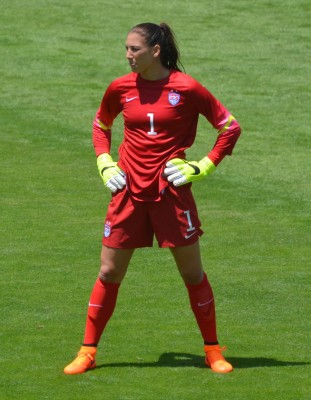
After 16 years, 202 international appearances, two Olympic Gold Medals and one World Cup victory, Hope Solo’s tenure as the goalie for the U.S. Women’s National Soccer Team has almost certainly ended. For well over a decade, Solo’s dominance in the net provided the anchor for an American team that consistently ranked as one of the best in the world. On Aug. 24, however, U.S. Soccer terminated Solo’s contract and suspended her for six months. These disciplinary actions came less than two weeks after Solo’s controversial postgame remarks following the U.S. team’s Olympic quarterfinal loss to Sweden in penalty kicks. Solo labeled the Swedish team “a bunch of cowards” in reference to their conservative style of play and later claimed that “the best team did not win.”
The sports realm is no stranger to athletes like Solo. The physical intensity and commercial pressure of top-level pro sports inevitably breed and attract more than a handful of hyper-competitors who put winning ahead of feelings like humility and mutual respect that were touted so highly by the coaches of our youth. But this isn’t little league. This is professional competition on a world stage. So just how important is sportsmanship in professional sports?
Well, it depends who you ask. Many have jumped to Solo’s defense since the suspension was announced, proclaiming it as unfairly harsh for a mistake made in the heat of the moment. Solo’s response to the scandal has largely followed the same logic. After the game she tweeted, “losing sucks. I’m really bad at it.” And in the statement she published online after her contract was terminated, Solo proclaimed, “I could not be the player that I am without being the person that I am.” Her logic seems to be that she is simply not the type of person who can take losing in stride, and that it is unfair to judge her for this more than for her passion and performance on the field.
Some fans agree, and see censorship and excessive political correctness as the issue here, more so than an athlete venting frustrations after a tough loss. But where do we draw the line between censorship and sportsmanship? Should an athlete be obligated to hide their true thoughts out of respect, or should they be allowed to always speak their mind?
On the one hand, there are athletes who have made their careers off of never holding back and been successful because of it. Richard Sherman, the Seattle Seahawks defensive back who made headlines for his postgame trash talk following his team’s victory over the San Francisco 49ers, as well as his multiple criticisms of Roger Goodell and the NFL, comes to mind as someone whose polarizing speech has made him a divisive figure, but has not stopped him from reaching the pinnacle of his sport. Other athletes of the past such as Kevin Garnett and tennis great John McEnroe are among those whose sportsmanship left something to be desired, but who achieved at a high level despite of it. However, other athletes such as disgraced ex-New York Rangers winger Sean Avery and former NBA player Latrell Sprewell, who famously attacked and choked his coach at practice in 1997, have seen their careers decline and die because of their poor sportsmanship and inability to control their tempers.
And just as the careers paths of volatile athletes are varied, so too are the regulations that govern pro sports. Trash talk is rampant in most American professional sports leagues and is seen usually as a part of the game, although recently both the NBA and NFL have added rules restricting showboating in the name of sportsmanship. In soccer, there has been a recent crackdown on racism, which has always plagued a game that enjoys such international popularity.
But Solo’s comments were not racism, and so the response to them is not as clear cut. Some have suggested that part of the reason for Solo’s dismissal was because her comments came while she was representing her country at the Olympics, an event that has always tried to encourage cooperative, as well as competitive, spirit. And to be sure, the image of Solo, the brash American, pouting after losing to quiet and unassuming Sweden is not a good look for U.S. athletics. In all likelihood, Solo’s punishment had more to do with the fact that this was nowhere close to her first brush with controversy.
Throughout her career, Solo has been known to criticize her coaches and fellow players, and more notably, she was charged with domestic violence in 2014 and implicated in her husband’s 2015 DUI. After serving no suspension for the domestic assault and 30 days for the DUI, this latest punishment was seen by many, including her coach Jill Ellis, as a response to the “sum total of actions.”
One could look at the punishments for Solo’s various actions over the years and say that, like so many pro sports entities, U.S. Soccer’s priorities are out of whack. Or, it could just as easily be true that this final act was simply the straw that broke the camel’s back, and that the U.S. women’s team was simply done putting up with the drama that’s always accompanied Solo’s immense talent. It is also hard not to question whether the organization would have been more lenient with Solo, who is now 35, if she were still in her prime, but that is purely speculation.
In the statement released by U.S. Soccer, President Sunil Gulati explained the decision by stating that Solo’s actions “do not meet the standard of conduct we require from our National Team players.” This statement seems to be his way of asserting the values of American soccer and athletics: that one should be gracious in victory or defeat, and that athletes who do not subscribe to this are not welcome, regardless of their talent.
Some will oppose the dismissal of a star athlete for an offhand comment, and some will applaud it as a victory for “playing the game the right way.” Regardless of where you fall in the debate, it seems that at high-level pro sports, the values of the youth league, where sportsmanship is praised above all else, can still win out. For now, anyway.




